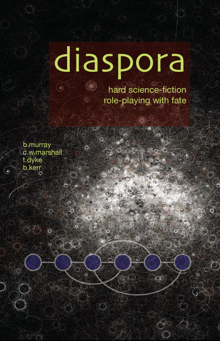This article originally appeared in Issue #014, February 2011, of the downloadable PDF magazine.
 Diaspora:
Hard Science Fiction Role-Playing with FATE. B.Murray et alia.
Diaspora:
Hard Science Fiction Role-Playing with FATE. B.Murray et alia.
VSCA Publishing http://www.vsca.ca
257pp, softcover (trade ppb)
US$24.99
EDITOR’S NOTE: The decision to run this review rests entirely with the Editor, who takes the position that, as with Starblazer Adventures, Hyperlite, or the 100 Plot Seeds articles, the product being discussed may be of interest to Traveller players as a potential source of ideas to mine. Publication of the review does not imply endorsement or futher support of the product by Freelance Traveller (unless warranted by demand), and all reviews are solely the opinions of the authors.
Though not itself Traveller, Diaspora is the heir to a non-commercial adaptation of Traveller to FATE, ‘Spirit of the Far Future’, by the same author, and seems to be a good candidate for introducing Traveller players to Narrativist play and the FATE (Fantastic Adventures in Tabletop Entertainment) system. Diaspora’s debt to Traveller is explicitly acknowledged, and a minimal web search brings the impression that Diaspora could be considered ‘FATE Traveller’ with the serial numbers filed off.
On The Shelf
Unlike so much of the role-playing industry, Diaspora eschews the large US-Letter/ISO-A4 format in favor of trade paperback/digest/A5 size. The black cover sports an abstract image which might be a representation of a particle cloud chamber, plus a diagram composed of connected circles (which turns out to be a representation of a ‘cluster’, an important concept in the Diaspora setting). The text is all in lower-case, in a sans-serif font.
Initial Impressions
The book appears well-organized, presenting concepts in a logical order, using type that is a readable size and style. The basics of the FATE system are presented first, followed by sections on developing a ‘cluster’ (which serves as a setting for a campaign), and developing characters. These are tied together with a chapter on play, and then chapters on personal, space, social, and platoon combat. Charts and sidebars, where needed, are simple, and clearly set off from the text - but never difficult to find when first referenced.
On Closer Inspection
It might take two readings of the first four sections to really understand just how much of a paradigm shift the FATE system and Diaspora represent. Where Traveller unarguably leaves the referee in overall charge of arbitrating the reality of the game, FATE virtually insists that the referee do no more than a basic outline, and then hand development of the adventure over to the group (which the authors of Diaspora refer to as the ‘table’)—and that the referee should also be a player, and not merely the hand in the back of the NPC puppets. Character creation is a group/table activity, not an individual one; the typical FATE character doesn’t encounter the rest of the party for the first time while drinking his/her separation bonus—characters have reasons to know and contact with each other, as part of their backstories. Players are encouraged to develop their characters over time, from session to session, although the ‘power level’ of the campaign doesn’t change—if a player increases one skill, it’s at the expense of another, and taking new aspects or stunts means discarding old ones. The ‘FATE Point’ mechanic is a major impetus to playing ‘in character’, even when doing so might be to the character’s—or party’s—disadvantage.
Throughout the game, mechanics (based on four FUDGE dice) are minimal, being used only to support the narrative. Often, the mechanical results aren’t a straight yes/no success/failure determinant; rather, they might affect the effectiveness of the narrated actions, and through reconciling the opposed narratives, describe the overall outcome—which may end up being neither complete success nor complete failure for either side. Even nonviolent social interactions can be described as a metaphorical combat, and Diaspora models it as such—the Traveller scenario ‘Exit Visa’ (often considered boring in most Traveller implementations, if useful for introducing the mechanical aspects of the game) would become a series of ‘social combats’, and would provide a much better introduction to most aspects of a FATE-based game than it does to any version of Traveller.
Summary
As presented, Diaspora doesn’t need rule supplements, setting sourcebooks, or equipment catalogs—it is as complete as it needs to be in the core volume, and it can be argued, strongly, that pre-development detracts from the game, as it removes the table interaction that would ‘connect’ the characters—and the players—to each other and to the setting. With the strong (virtually overriding) emphasis on narrative, there is no reason that the table could not make a campaign more (or less) Traveller-like than the book presents. If you have to choose between Traveller and Diaspora, of course choose Traveller—but if you have the liquidity and are looking for something different to reinvigorate your group, you’d be hard-pressed to find a better choice than Diaspora.
 Freelance
Traveller
Freelance
Traveller